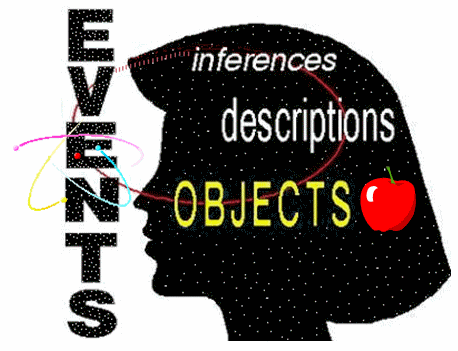
Bedpans and Flowerpots
Written 1996, updated 2012 by Steven Lewis
An old Abbott and Costello comedy routine went something like this:
"My mother died today."
"That's too bad."
"No, that's good. She was 88 and had been suffering for years with gout."
"Gout. That's not good."
"No, actually some of the greatest geniuses of all time, like Ben Franklin, suffered from gout. My mother was a genius."
"She was a genius? How wonderful! I wish I had met her."
"No you shouldn't. Like many geniuses, she went crazy and had to be locked up."
"Crazy's definitely a bummer. Too bad."
"Not really. In the asylum she met this nice guy, my dad, who was crazy enough to marry her."
This comedy routine illustrates an important gs principle: any situation can be evaluated differently depending upon what relations we abstract. A rainy day can be good for your crops, bad for your picnic, but great for a nap (unless, of course, your roof leaks). A rainy day can be all these things and more 'at the same time' from different perspectives.
 We have a tendency in our traditional semantic environment to evaluate situations as either good or bad. The botulism toxin and Adolf Hitler are usually evaluated as bad, whereas love and Abraham Lincoln are usually classified as good. We find it awkward, due to a confusion of the orders of abstraction, to evaluate the botulism toxin as both good and bad. We may ask, "What is it really? Good or bad?" Most Americans would probably label the botulism toxin as bad ... after all, it has "toxin" in its name.
We have a tendency in our traditional semantic environment to evaluate situations as either good or bad. The botulism toxin and Adolf Hitler are usually evaluated as bad, whereas love and Abraham Lincoln are usually classified as good. We find it awkward, due to a confusion of the orders of abstraction, to evaluate the botulism toxin as both good and bad. We may ask, "What is it really? Good or bad?" Most Americans would probably label the botulism toxin as bad ... after all, it has "toxin" in its name.
However, a "toxin" can be "good" if we use it to eradicate certain predators that might rob us of our food or health. Those predators, meanwhile, would probably evaluate the toxin as bad, if they could do so! The botulism toxin has been found to be useful to treat people whose muscles chronically contract. A small amount of the botulism toxin injected into spastic muscles will relax them for nearly a month. Can you imagine the shock many people must feel when the doctor says he is going to inject them with the botulism toxin! "Did you say your name was Kevorkian?"
"Pesticide" is another term that is identified with a particular evaluation in our culture. Many folks spend extra cash to buy "organic" produce free of "pesticides." Of course, no produce can ever be free of pesticides, for plants themselves produce the vast majority of pesticides that we consume in our foods. Meanwhile, when you are sick with a bacterial or fungal infection your doctor will probably write you a prescription for an antibiotic, which Americans often expect and demand. What they do not seem to realize is that they are swallowing pesticides. If the doctor labeled them pesticides, the patient would probably look for another doctor. But labeling them "antibiotics" produces a warm and cuddly semantic reaction instead.
"Love" is a term that usually evokes a positive semantic reaction. "Love is good" the masses might say. However, if we evaluate by context we may find that the "love" of John Hinkley for Jodi Foster was not so good. The "love" of a pyromaniac for fire is not so good. How about the love of a Nazi for Hitler?
"Hate," on the other hand, is usually identified with a negative semantic reaction. But what about hating the assault on the Twin Towers on 9/11? What about "hatred" of racism?
"Agreement" is another term that would probably evoke approving semantic reactions in most people. "Yes, I am in favor of agreement?" But agreement toward what? Agreement with the Nazi's regarding the treatment of Jews? Agreement with a builder who decides to use inferior grade lumber to construct a building so he can pocket more profit?
From a gs perspective, any individual, situation .... has indefinite numbers of characteristics, including relations, that we can abstract. If we evaluate one relationship that we abstract and identify it with the original situation then we confuse the orders of abstraction. If we become conscious of abstracting we may still evaluate situations, but we will not identify our evaluations with what we evaluate. We will be more open toward alternative views. We will be more capable of changing our evaluation based on new information or a different context.
Much of the political discussion in our American culture consists of an attempt to evoke identity reactions in the American voter. A politician may try to hang a group of slur words on his opponent ("racist," "spendthrift" ...) while he tries to evoke other types of identity reactions in the voter toward himself ("family," "God," "flag" ...). This type of "debate" dominates national politics because Americans lack significant consciousness of abstracting.

As we become more conscious of abstracting we learn to evaluate more by the details of a situation. We consciously look for unique characteristics or alternative relationships in any situation. Labeling a situation "good" or "bad" or "pen" or "car" does not preclude our evaluating later in a different and, seemingly, contradictory way. But the botulism toxin can be bad for you if you swallow enough of it in your food; it can be good for you if you need it to quiet spastic muscles. When we become conscious of abstracting we evaluate extensionally -- by context -- and when the context changes the evaluation may change too.
Consciousness of abstracting sets us free from the chains of "preconceived notions" to evaluate situations from different perspectives. What we commonly label a "pen" can also be used as and labeled a "bookmark" or a "doorstop." For many years my mother kept "bedpans" on her front porch .... She didn't lack indoor plumbing. She used them as flowerpots! Think of the creative energies she might have unleashed had she been formally trained in the consciousness of abstracting!
Go to General Semantics Home Page ||| Go to Steven Lewis Home Page